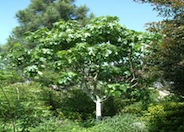
Common name:Blue Fescue, Blue Fescuegrass
Botanical name:Festuca glauca
This groundcover/grass will grow less than 1' tall and has small, blue green leaves.

Common name:Dusty Miller, Silver Groundsel
Botanical name:Senecio cineraria
The Dusty Miller exhibits growth to 1' or more, with velvet gray leaves that have broad, roundish lobes. Yellow flower heads appear through the middle of the plant during most months of the year. Cut heads back occasionally to encourage bushiness.

Common name:Sea Lavender, Statice
Botanical name:Limonium perezii
This mounding shrub will reach about 3' high and has large, dark green leaves with small blue and purple flowers that bloom in spring and summer.

Common name:Bush or Dome Euphorbia
Botanical name:Euphorbia characias
This perennial will reach about 4' tall and has blue green leaves with bright green flowers that bloom from late winter to early spring.

Common name:Spanish Lavender
Botanical name:Lavandula stoechas
This dense shrub grows 2'-3' tall with blue gray foliage and deep purple flowers that have large showy bracts near the top of the spikes. It is drought tolerant . - Cornflower Farms

Common name:Olive, European Olive
Botanical name:Olea europaea
This broad tree will grow to 40' tall and has small, gray green leaves with fleshy black fruit that appears in fall.

Common name:Fig Edible
Botanical name:Ficus carica
This small tree produces wonderful figs that are a brownish red color.

Common name:Superba Fescue
Botanical name:Festuca amethystina 'Superba'
The Rainbow Fescue is a hardy fescue with fine, blue green foliage that grows 8" tall. It has spring flowers that are 12" above the foliage. This fescue is a very showy, neat grass for sunny spots during spring and fall. The Rainbow Fescue is drought tolerant. -Cornflower Farms

Common name:Hybrid Tea Rose (selections)
Botanical name:Rosa Hybrid Tea varieties
These shrubs and vines are the most loved in the Western USA and are very resilient. They come in a wide variety of sizes and colors and are easy to maintain with proper care. They can be used in a water-conserving garden with careful attention to irrigation practices.
The Magic of Mulch
In the natural world the endless cycle of birth, growth, decay, death and rebirth flows throughout the seasons. Plants die, leaves fall and new growth springs up in its place. Nothing is lost and the fallen leaves and dead plants decay into the soil, enriching it for the next generation of growth.
Click in the green box for more information
| Designer: | Front Yard Seating |
Photographer: GardenSoft |
Soils and Compost:
Maintain a two to four inch layer of mulch on the soil surface to reduce weeds, infiltrate rain water, and reduce compaction.
Water Saving Tip:
Mulching and adding compost to soil can minimize evaporation and help soil absorb and store water.
Integrated Pest Management:
Drip and other smart irrigation delivers water directly to roots, allowing no excess water for weeds.

